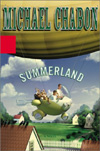Summerland
Reprinted from the April 2003 issue of Mythprint (Volume 40:4, Whole No. 253).
Reviewed by Laura Krentz
Long summer days are perfect for playing baseball and reading fat fantasy books like Harry Potter and Michael Chabon’s Summerland. Astute readers may notice some parallels between the two. Harry Potter and Ethan Feld, the young hero of Summerland, are both charged, somewhat reluctantly, to fight against the forces of evil, accompanied by another boy and girl and sometimes a giant or a sasquatch. Harry has lost both parents, and Ethan has lost his mother. Ethan’s bat can be wielded like Harry’s wand. Both even use flying cars of one sort or another. But Summerland is much more American, while Harry’s world is clearly British.
Pulitzer Prize winning author Chabon draws on American and Native American folklore, like the trickster villain Coyote, while also weaving characters from Norse, Celtic, and Hispanic mythology into a novel that unfolds like a baseball game, sometimes slow and leisurely, other times speeding up to a breathtaking pace. Ethan Feld is “the worst ballplayer in the history of Clam Island,” off the coast of Washington State. Jock MacDougal Field is on a part of Clam Island where it never rains, so games are never rained out. Ethan doesn’t find out why it never rains there until he is recruited by an old Negro League scout, Ringfinger Brown, not so much for his abilities at baseball as for his potential as a hero. Cutbelly, a werefox, explains that the universe is a great tree, the Lodgepole, with four main branches, which are the four worlds, each with many smaller branches and leaves. Shadowtails like Cutbelly can leap from branch to branch to travel between three of the worlds — the Summerlands, the Winterlands, and our world, the Middling. The fourth world has been closed off. When branches between worlds rub against each other, they form a gall which functions like a wormhole between them. The baseball field has a touch of the Summerlands. They know something is going wrong when it rains for the first time on the ball field, and Cutbelly says it’s the work of Coyote. Coyote is trying to destroy not just these galls but also the tree itself.
When Ethan’s inventor father is captured by Coyote, who wants to use his talents to poison the roots of the tree and bring an end to the universe, Ethan and fellow Little Leaguers Jennifer T. Rideout and Thor Wignutt set out in the old family Saab (pulled by Ethan’s father’s zeppelin) across the worlds to rescue him. They travel with two small Ferishers (don’t call them fairies!), a gentle female sasquatch named Taffy, and an undersized giant. Baseball is the universal sport in all the worlds. Along the way this motley team plays baseball games against ferishers, giants, and American tall tale heroes. Ethan acquires a bat that is a splinter of the big Lodgepole. Jennifer discovers her talent for pitching, and Ethan works at becoming a catcher. They must play as if the world depended on it, because ultimately, it does. Ethan’s watch shows the time in innings, and if Ethan and his friends don’t win in nine innings against Coyote, he will succeed in destroying the world. The ferishers call the end of the world Ragged Rock, like the Norse Ragnarok, and it appears to be approaching rapidly.
The book has many fascinating characters, not all of them human. Some are more developed than others. Jennifer loves baseball but is embarrassed by her father’s drinking. Ethan struggles with the pain of losing his mother and possibly his father, and his pain is also reflected in the rubbing of a knot on his bat that makes every swing excruciatingly painful. The language is often poetic, and the book is full of humorous details such as the fairy hoard of things like AAA batteries, unmatched socks, and the lost strings from bathing trunks. Sometimes it feels like there is too much detail and too many characters to keep track of. The book could have used more editing to tighten it up. Summerland is a strange cross between A Wrinkle in Time and Field of Dreams. Baseball is often a metaphor for life, but Chabon also says: “A baseball game is nothing but a great slow contraption for getting you to pay attention to the cadence of a summer day.”
Readers who are not in a hurry will enjoy taking a trip to Summerland. Even if they don’t like baseball, the book can be enjoyed by fans of J.K. Rowling’s Harry Potter books, C.S. Lewis’s Narnia books, and Philip Pullman’s Golden Compass.

